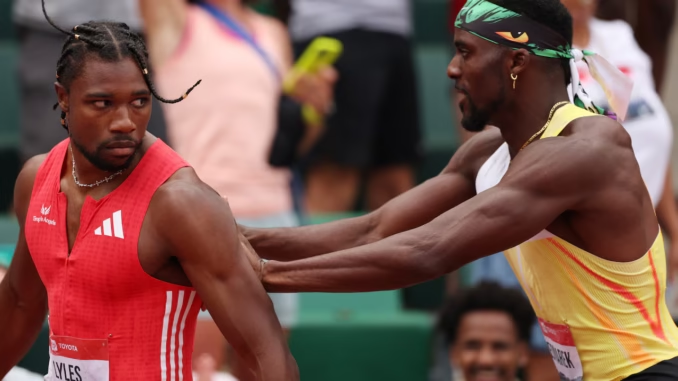
Track Drama: Olympic Star Accuses Rival of ‘Unsportsmanlike’ Behavior Mid-Race
From Olympic glory to mid-race scandal, elite track and field competition has again splashed into controversy. In a fiery accusation that’s rippled across social media and athletic circles, a decorated Olympic medalist has publicly accused a reigning world champion of ‘unsportsmanlike’ behavior during a critical race—a feud turning what should have been a display of grace into full-blown track drama.
The Incident: A Race Gone Wrong
During a high-stakes head‑to‑head matchup, the Olympic medalist, speaking for the first time since the event, claimed that their rival—no ordinary contender, but the current world champion—intentionally hindered them mid‑race. According to the accuser, the world champion veered into their lane in a deliberate attempt to block momentum, causing physical contact and disrupting rhythm in the final 200 meters.
The accusation centers on behavior described as clearly unsportsmanlike—“dirty tactics,” a “lack of respect,” and a willingness to bend the rules to gain advantage. While physical jockeying is not unheard of in close competition, credible observers say what happened crossed from aggressive racing into unethical interference.
What the Olympic Medalist Said
In a candid interview given shortly after the race, the Olympic medalist laid bare their frustration. They said:
“There was no question—they moved into me, cut me off, and knocked me off stride in the home straight. That’s not racing, that’s cheeking it.”
They continued:
“I’ve always respected them as an athlete. But what I felt at that moment wasn’t respect—it was dangerous.”
Response from the World Champion
In response, the world champion’s camp issued a carefully worded denial. They described the incident as a “racing incident—nothing intentional,” and emphasized the chaotic nature of tightly packed sprints or middle-distance fights where slight shifts in speed or lane are common. They declined to repeat the world champion’s personal statement, insisting instead that video officials saw no rule violation, and that no protest had been filed at the time.
Community Reaction: Fans and Analysts Sound Off
Reaction from fans, commentators, and fellow athletes has been explosive. On social media, comments range from outrage and demands for sanctions to support for graceful composure in conflict.
Some observers pointed to Reddit commentary from recent competitions, where unsportsmanlike conduct has stirred heated debate. One noted athlete was criticized for overtaking in dangerously tight spaces, prompting comments like:
“She didn’t seem space conscious… overtaking in a way that didn’t seem considerate… I think the incident wasn’t peculiar, it’s a pattern” (reddit.com).
While not the same event, the tone reflects a growing intolerance for too-aggressive jostling among peers.
Rules & Regulations: Where the Line Is Drawn
Track events do allow a degree of physical interaction—especially on curves or in shared lanes. Contact becomes unacceptable when it:
- Pushes or shoves another athlete,
- Intentionally impedes their path,
- Results in a dangerous or disruptive collision.
If deemed deliberate, the offender may face disqualification under World Athletics regulations pertaining to interference. However, without an official protest or independent evidence of intent, referees rarely penalize such incidents retroactively. That may be what’s unfolding here: the accused’s team insists no official protest was submitted, effectively limiting any disciplinary follow-up.
Why This Case Matters
This incident isn’t just about amateur etiquette. When a top Olympic medalist calls out a world champion in public, the stakes include:
- Sporting Integrity: Critics ask: if world-class athletes resort to cutting opponents off or pushing others out of their stride, what example are they setting?
- Athlete Safety: At full race speed, even small contact can cause serious falls or injury.
- Precedent in Enforcement: With no protest filed in the moment, will this press conference change how officials review races down the line?
Larger Implications: Reputation and Fallout
For the Olympic medalist, courage in speaking out may elevate their voice as one who champions fair play. But they also risk being branded as complaining—especially if no ruling or official judgment follows.
For the world champion, denial is standard, but the lack of clear exoneration may leave lingering doubt in public perception—and among sponsors, fans, and peers.
Expert Analysis: What Whistle‑blowers Are Saying
Retired athletes and observers have weighed in. One former competitor noted:
- “At this elite level, friction is inevitable. But steering into someone’s gait deliberately? That’s not racing—that’s chessboard tactics.”
Another coach stressed that failure to file an in-the-moment protest by the aggrieved athlete is a missed opportunity—once immediate replay isn’t used, most cases go unaddressed.
Next Steps: What Happens Now?
There are a few possible outcomes:
| Path | What It Could Mean |
|---|---|
| Video review by judging body | If footage confirms interference, possible retroactive action—but rare without formal protest |
| Official protest from the accuser | Must be filed promptly; opens door to disciplinary review |
| Public resolution or apology | Sometimes athletes settle disputes off‑track to preserve goodwill |
| No formal consequences | Often the case if race officials rule contact incidental or race‑style misjudgment |
Final Thoughts: An Era of Heightened Accountability
In sport—especially Olympic-level track and field—expectations around professionalism and respect are rising. Fans and fellow athletes increasingly demand not just performance, but honorable conduct. As one Reddit commenter put it: “it’s a shame to see a pattern of tight-space overtakes turning into controversy” (reddit.com).
When champions clash, legacies may hinge not only on winning medals, but also on how they race—and how they respect their rivals.
As the dust settles, one thing is clear: track drama like this casts scrutiny not just on the athletes involved, but on the system of officiating and the culture of elite competition itself.
Leave a Reply